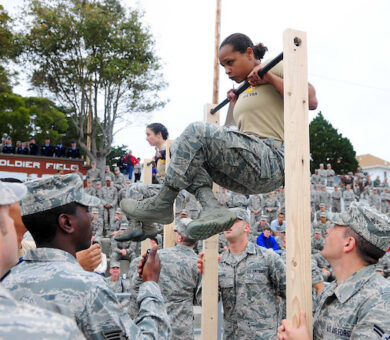Good Captains, Bad Captains and Team Culture
Are you currently, or do you aspire to be, the captain of your team?
Do you already hold the position? You may have been given the title, but are you truly a captain? Have your coaches chosen you to lead simply because you are a senior or an upper-class athlete, or are you a captain for some other reason?
Think about it. You’ve worked hard. You’ve paid your dues. You’ve been there the longest. You probably know what the coaches expect, what practices look like, and what your role is. Right?
Not so fast.
Reasons One Might Hold the Title, Captain
- They are seniors.
- They are the best players.
- They are the coaches’ “favorites.”
- They have a parent coaching the team.
- They don’t play a lot, so the coach makes them captain to keep them engaged.
- They are smart players.
- They work hard.
- They are loud.
Though you may have the title, how do you truly become a good team captain? How do you influence your team to respect you and follow your lead?
Definition of a Good Captain
So how do you define a good captain? According to the Webster Dictionary, captains are defined as commanders or masters of groups, people who lead or supervise others, people who are in charge, leaders that have influence over others, and folks that have a higher rank than other team members. Though these definitions may be true, they do not guarantee a good captain.
Based on the book, “Beyond the Talent: Profile of a Winning Team,” captainship is not always earned. Find My Team traveled the country collecting descriptions, from both high school and college captains from all sports, who have earned the title.

We begin with the good captains.
Good Captain Behaviors:
- Always says something meaningful in team meetings
- Always supports the coaches, even if she disagrees
- Does not worry about being liked
- Earns the respect of teammates and coaches through words and actions
- Is engaged as an “all-in” participant and influences others to do the same
- Is more interested in helping teammates look good over herself looking good
- Never puts down a coach or player in public or private conversations
Do you see your own, or other teammates’, characteristics on this list? Are these actions you have taken in the past? Have you earned your teammates’ and your coaches’ respect? Trust?
As you think about captainship, here are some examples of captains who earned the respect of their teammates and others.
- Caitlyn Clark – redefined women’s basketball
- Micheal Jordan – redefined men’s basketball
- Steve Jobs – Co-creator of the Apple (captain of a business team)
- Oprah Winfrey – talk show host (entertainment team)
The impact of captains, such as these listed, are vast. These people are influencers who believe in their mission, and who lead positively. Their captainship changes lives and organizations. They make a positive impact that lasts a long time and influences the future.

As we traveled the country looking for the good captain behaviors, we were also able to collect the not so good ones. As you reflect on your own team leadership, or that of your teammates, here is a list of some of the not-so-great behaviors.
Not-so-Good Captain Behaviors:
- Does not help a teammate up after diving for a loose ball
- Is outright disrespectful to coaches or teammates
- Allows teammates to struggle rather than offering encouragement
- Assumes rules don’t apply to her
- Makes excuses or throws blame for personal mistakes or behavior
- Negatively mocks other players or coaches
- Works hard in front of coaches but not when coaches are not present
- Is poison in the locker room
Does this list reflect you or the current captains on your team? Are there ways you could improve your leadership based on the above lists?
While thinking about what could be improved, we also put together a list of the “not so good” captain examples. We won’t name names, but we will point out the outcomes of not so good captainship.
- Sports scandals that took down a person, a team, or a group of people (Usually initiated by one or two people)
- Business failures that led to the demise of an organization
- Education scandals where folks tried to get around the system
The list could go on, but you get the idea. Poor captains impact team performance, morale, chemistry, and effectiveness. Long-term, poor captainship affects team culture and overall success.
So why do some teams struggle? What are they missing?
Reasons Teams Struggle:
- They are not in sync.
- They are made up of selfish players; the “me” before the “we.”
- They do not work well together.
- They have cliques.
- They disrespect each other and/or their coaches.
- They throw blame and won’t take responsibility for their actions.
- They don’t really love the sport they play.
Sounds harsh? It is unbearable to play on teams with this sort of culture, but teams with this culture need someone, or a group of people, to bring everyone together with a shared vision and a shared responsibility. Everyone has a role to play, but it sure does help to have a good captain and some leadership.
So, the next question is: What does the culture on your team look like? How have you influenced this culture?
Here is a shortlist of good culture, taken from the book, “How to Build and Sustain a Championship Culture.”

Behaviors Within Good Cultures
Teammates and Coaches:
- Work hard every day because they want to, not because they have to
- Are fully engaged and committed to the team’s mission and goals
- Play passionately for each other and not just themselves
- Hold each other accountable
- Don’t give or tolerate lame excuses for why people didn’t perform or produce
- Challenge and support each other through thick and thin
- Build an unbreakable sense of unity and chemistry
Do any of these examples mirror your team culture? It is not impossible to get a good, or even great, culture if you start the work as soon as you can.
If you think your culture is already pretty good, then how can you help maintain it? The job of a good captain does not stop when the culture is good. The responsibility increases because maintaining is more difficult than building a good culture in the first place.
This is where the leadership kicks in. Leadership does not need a captain title, but all captains need to share some of the leadership responsibilities.
If you are on a team with a not-so-good culture, you have choices to make.
If you are a senior, you may say, “My time is almost over, and I’m not going to be able to change what needs to be changed in only a season.” If you are a younger player, you may say, “I’m too young and don’t want to step on anyone’s shoes. I’ll leave it up to my upper-class teammates.”
Whether you are an older or a younger player, you have the opportunity to lead and influence your team. Whether you are a captain or not, you have an important role in how your team performs and the culture that exists.
Why Is It Hard to Find Good Captains?
Because Members of the Team:
- Assume someone else will take the leadership/captain role – it’s someone else’s responsibility
- Believe they can’t fix it
- Believe they are not supported by their coaches
- Believe they are outnumbered
- Are afraid of being disliked
- Don’t want the responsibility because it takes a lot of hard work
There are many roles to fill, but the leadership/captain role is a critical one. The person or people that take on the captain role must be good teammates. They must care about their teammates and coaches. They must be engaged, and in tune, with the team’s mission. They must be able to influence their teammates.

You don’t have to be the best, oldest, smartest, loudest, or most disciplined player. You just need to be a good teammate and an influencer. Be a role model. You say and do the right things, and you get others to do the same. You come up with fun and creative ways to get your teammates onboard with what the coaches need to be done. You get your teammates to trust the process.
If you are the captain or aspire to be, then now is the time to get started on your captainship and leadership journey. If you need help in captaining, Find My Team will help you come up with a plan of action. Reach out to us at hello@findmyteam.com.
Good leaders/captains are not easy to find, and college coaches are always searching for those players who want responsibility and are able to handle it. Becoming a captain and truly working on leadership skills will take you a long way, both in college and beyond.
Just like anything, practice makes us better. Start now.


